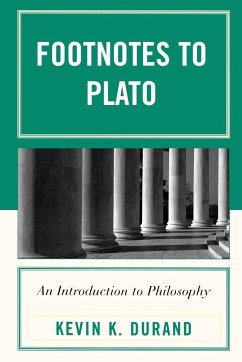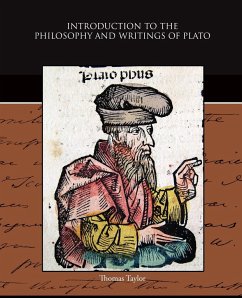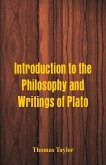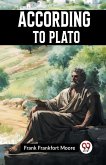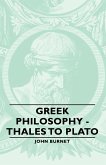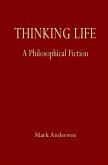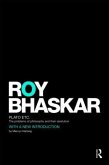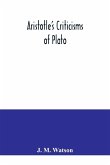- Broschiertes Buch
- Merkliste
- Auf die Merkliste
- Bewerten Bewerten
- Teilen
- Produkt teilen
- Produkterinnerung
- Produkterinnerung
This book is a guide for beginning students of philosophy as they begin to systematically reflect upon philosophical matters. The author uses primary texts, commentaries, and guided readings to encourage students to enter into conversation with contemporary scholarship, great thinkers, and with peers to gain a deeper understanding of philosophy.
Andere Kunden interessierten sich auch für
![Introduction to the Philosophy and Writings of Plato Introduction to the Philosophy and Writings of Plato]() Thomas TaylorIntroduction to the Philosophy and Writings of Plato17,99 €
Thomas TaylorIntroduction to the Philosophy and Writings of Plato17,99 €![Introduction to the Philosophy and Writings of Plato Introduction to the Philosophy and Writings of Plato]() Thomas TaylorIntroduction to the Philosophy and Writings of Plato20,99 €
Thomas TaylorIntroduction to the Philosophy and Writings of Plato20,99 €![According To Plato According To Plato]() Frankfort Moore FrankAccording To Plato17,99 €
Frankfort Moore FrankAccording To Plato17,99 €![Greek Philosophy - Thales to Plato Greek Philosophy - Thales to Plato]() John BurnetGreek Philosophy - Thales to Plato35,99 €
John BurnetGreek Philosophy - Thales to Plato35,99 €![Thinking Life Thinking Life]() Mark AndersonThinking Life15,99 €
Mark AndersonThinking Life15,99 €![Plato Etc Plato Etc]() Roy BhaskarPlato Etc78,99 €
Roy BhaskarPlato Etc78,99 €![Aristotle's criticisms of Plato Aristotle's criticisms of Plato]() J. M. WatsonAristotle's criticisms of Plato20,99 €
J. M. WatsonAristotle's criticisms of Plato20,99 €-
-
-
This book is a guide for beginning students of philosophy as they begin to systematically reflect upon philosophical matters. The author uses primary texts, commentaries, and guided readings to encourage students to enter into conversation with contemporary scholarship, great thinkers, and with peers to gain a deeper understanding of philosophy.
Hinweis: Dieser Artikel kann nur an eine deutsche Lieferadresse ausgeliefert werden.
Hinweis: Dieser Artikel kann nur an eine deutsche Lieferadresse ausgeliefert werden.
Produktdetails
- Produktdetails
- Verlag: University Press of America
- Seitenzahl: 506
- Erscheinungstermin: 23. Juli 2009
- Englisch
- Abmessung: 229mm x 152mm x 30mm
- Gewicht: 814g
- ISBN-13: 9780761846819
- ISBN-10: 0761846816
- Artikelnr.: 26848364
- Herstellerkennzeichnung
- Produktsicherheitsverantwortliche/r
- Europaallee 1
- 36244 Bad Hersfeld
- gpsr@libri.de
- Verlag: University Press of America
- Seitenzahl: 506
- Erscheinungstermin: 23. Juli 2009
- Englisch
- Abmessung: 229mm x 152mm x 30mm
- Gewicht: 814g
- ISBN-13: 9780761846819
- ISBN-10: 0761846816
- Artikelnr.: 26848364
- Herstellerkennzeichnung
- Produktsicherheitsverantwortliche/r
- Europaallee 1
- 36244 Bad Hersfeld
- gpsr@libri.de
Kevin K. Durand is the dean of academics at the LISA Academy College Preparatory School in Little Rock, Arkansas. He has published broadly in philosophy, religion, and ethics.
Chapter 1 Preface Chapter 2 Introduction Chapter 3 Chapter 1 - Ancient
Philosophy Part 4 Section 1: Heraclitus - Fragments Part 5 Section 2.1: The
Search for the Historical Socrates Part 6 Section 2.2: Trial Trilogy, Part
I - Euthyphro Part 7 Section 2.3: Trial Trilogy, Part 2 - Apology Part 8
Section 2.4: Trial Trilogy, Part 3 - Crito Part 9 Section 3.1: Plato and
the Virtue of Socrates Part 10 Section 3.2: Socrates, Philosophy's Martyr
Part 11 Section 3.3: Plato and Justice Part 12 Section 4.1: Reading
Aristotle Part 13 Section 4.2: Aristotle - Categories Part 14 Section 4.3:
Aristotle and the Highest Good Part 15 Section 4.4: Aristotle and the Human
Function Part 16 Section 4.5: Aristotle and Virtue Chapter 17 Chapter 2 -
Medieval Philosophy Part 18 Section 5: The Advent of Medieval Philosophy
Part 19 Section 6.1: Reading St. Augustine Part 20 Section 6.2: St.
Augustine, Doctor of the Church Part 21 Section 7: Boethius, Medieval
Metaphysician Part 22 Section 8.1: Reading St. Anselm Part 23 Section 8.2:
St. Anselm and the Ontological Argument Part 24 Section 9.1: Reading St.
Thomas of Aquinas Part 25 Section 9.2: St. Thomas, Doctor of the Church
Part 26 Section 10: William of Ockham: Ockham's Razor Chapter 27 Chapter 3
- Modern Philosophy Part 28 Section 11: The Birth of the Modern Era Part 29
Section 12.1: Descartes and the Method of Doubt Part 30 Section 12.2:
Descartes and the Nature of the Mind Part 31 Section 12.3: Descartes and
the Existence of God Part 32 Section 12.4: Descartes and Theory of Truth
Part 33 Section 12.5: Descartes, Father of Modern Philosophy Part 34
Section 13.1: Reading David Hume Part 35 Section 13.2: Hume and the Origin
of Ideas Part 36 Section 13.3: Hume and the Association of Ideas Part 37
Section 13.4: Hume and Substance Part 38 Section 13.5: Hume and Causation
Part 39 Section 13.6: Hume and Religion Part 40 Section 14.1: Reading
Immanuel Kant Part 41 Section 14.2: Kant and the Good Will Part 42 Section
14.3: Kant and the Metaphysics of Morals Part 43 Section 14.4: Kant and the
Categorical Imperative Part 44 Section 15: Mary Wollstonecraft, Forgotten
Philosopher Chapter 45 Chapter 4 - Middle/Late Modern Philosophy Part 46
Section 16: The Fragmentation of Philosophy Part 47 Section 17.1: Reading
John Stuart Mill Part 48 Section 17.2: Mill and the Principle of Utility
Part 49 Section 17.3: Mill and The Subjection of Women Part 50 Section
17.4: Mill and the Benefits of Liberty Part 51 Section 18.1: Reading Karl
Marx Part 52 Section 18.2: Marx and the Philosophy of History
Philosophy Part 4 Section 1: Heraclitus - Fragments Part 5 Section 2.1: The
Search for the Historical Socrates Part 6 Section 2.2: Trial Trilogy, Part
I - Euthyphro Part 7 Section 2.3: Trial Trilogy, Part 2 - Apology Part 8
Section 2.4: Trial Trilogy, Part 3 - Crito Part 9 Section 3.1: Plato and
the Virtue of Socrates Part 10 Section 3.2: Socrates, Philosophy's Martyr
Part 11 Section 3.3: Plato and Justice Part 12 Section 4.1: Reading
Aristotle Part 13 Section 4.2: Aristotle - Categories Part 14 Section 4.3:
Aristotle and the Highest Good Part 15 Section 4.4: Aristotle and the Human
Function Part 16 Section 4.5: Aristotle and Virtue Chapter 17 Chapter 2 -
Medieval Philosophy Part 18 Section 5: The Advent of Medieval Philosophy
Part 19 Section 6.1: Reading St. Augustine Part 20 Section 6.2: St.
Augustine, Doctor of the Church Part 21 Section 7: Boethius, Medieval
Metaphysician Part 22 Section 8.1: Reading St. Anselm Part 23 Section 8.2:
St. Anselm and the Ontological Argument Part 24 Section 9.1: Reading St.
Thomas of Aquinas Part 25 Section 9.2: St. Thomas, Doctor of the Church
Part 26 Section 10: William of Ockham: Ockham's Razor Chapter 27 Chapter 3
- Modern Philosophy Part 28 Section 11: The Birth of the Modern Era Part 29
Section 12.1: Descartes and the Method of Doubt Part 30 Section 12.2:
Descartes and the Nature of the Mind Part 31 Section 12.3: Descartes and
the Existence of God Part 32 Section 12.4: Descartes and Theory of Truth
Part 33 Section 12.5: Descartes, Father of Modern Philosophy Part 34
Section 13.1: Reading David Hume Part 35 Section 13.2: Hume and the Origin
of Ideas Part 36 Section 13.3: Hume and the Association of Ideas Part 37
Section 13.4: Hume and Substance Part 38 Section 13.5: Hume and Causation
Part 39 Section 13.6: Hume and Religion Part 40 Section 14.1: Reading
Immanuel Kant Part 41 Section 14.2: Kant and the Good Will Part 42 Section
14.3: Kant and the Metaphysics of Morals Part 43 Section 14.4: Kant and the
Categorical Imperative Part 44 Section 15: Mary Wollstonecraft, Forgotten
Philosopher Chapter 45 Chapter 4 - Middle/Late Modern Philosophy Part 46
Section 16: The Fragmentation of Philosophy Part 47 Section 17.1: Reading
John Stuart Mill Part 48 Section 17.2: Mill and the Principle of Utility
Part 49 Section 17.3: Mill and The Subjection of Women Part 50 Section
17.4: Mill and the Benefits of Liberty Part 51 Section 18.1: Reading Karl
Marx Part 52 Section 18.2: Marx and the Philosophy of History
Chapter 1 Preface Chapter 2 Introduction Chapter 3 Chapter 1 - Ancient
Philosophy Part 4 Section 1: Heraclitus - Fragments Part 5 Section 2.1: The
Search for the Historical Socrates Part 6 Section 2.2: Trial Trilogy, Part
I - Euthyphro Part 7 Section 2.3: Trial Trilogy, Part 2 - Apology Part 8
Section 2.4: Trial Trilogy, Part 3 - Crito Part 9 Section 3.1: Plato and
the Virtue of Socrates Part 10 Section 3.2: Socrates, Philosophy's Martyr
Part 11 Section 3.3: Plato and Justice Part 12 Section 4.1: Reading
Aristotle Part 13 Section 4.2: Aristotle - Categories Part 14 Section 4.3:
Aristotle and the Highest Good Part 15 Section 4.4: Aristotle and the Human
Function Part 16 Section 4.5: Aristotle and Virtue Chapter 17 Chapter 2 -
Medieval Philosophy Part 18 Section 5: The Advent of Medieval Philosophy
Part 19 Section 6.1: Reading St. Augustine Part 20 Section 6.2: St.
Augustine, Doctor of the Church Part 21 Section 7: Boethius, Medieval
Metaphysician Part 22 Section 8.1: Reading St. Anselm Part 23 Section 8.2:
St. Anselm and the Ontological Argument Part 24 Section 9.1: Reading St.
Thomas of Aquinas Part 25 Section 9.2: St. Thomas, Doctor of the Church
Part 26 Section 10: William of Ockham: Ockham's Razor Chapter 27 Chapter 3
- Modern Philosophy Part 28 Section 11: The Birth of the Modern Era Part 29
Section 12.1: Descartes and the Method of Doubt Part 30 Section 12.2:
Descartes and the Nature of the Mind Part 31 Section 12.3: Descartes and
the Existence of God Part 32 Section 12.4: Descartes and Theory of Truth
Part 33 Section 12.5: Descartes, Father of Modern Philosophy Part 34
Section 13.1: Reading David Hume Part 35 Section 13.2: Hume and the Origin
of Ideas Part 36 Section 13.3: Hume and the Association of Ideas Part 37
Section 13.4: Hume and Substance Part 38 Section 13.5: Hume and Causation
Part 39 Section 13.6: Hume and Religion Part 40 Section 14.1: Reading
Immanuel Kant Part 41 Section 14.2: Kant and the Good Will Part 42 Section
14.3: Kant and the Metaphysics of Morals Part 43 Section 14.4: Kant and the
Categorical Imperative Part 44 Section 15: Mary Wollstonecraft, Forgotten
Philosopher Chapter 45 Chapter 4 - Middle/Late Modern Philosophy Part 46
Section 16: The Fragmentation of Philosophy Part 47 Section 17.1: Reading
John Stuart Mill Part 48 Section 17.2: Mill and the Principle of Utility
Part 49 Section 17.3: Mill and The Subjection of Women Part 50 Section
17.4: Mill and the Benefits of Liberty Part 51 Section 18.1: Reading Karl
Marx Part 52 Section 18.2: Marx and the Philosophy of History
Philosophy Part 4 Section 1: Heraclitus - Fragments Part 5 Section 2.1: The
Search for the Historical Socrates Part 6 Section 2.2: Trial Trilogy, Part
I - Euthyphro Part 7 Section 2.3: Trial Trilogy, Part 2 - Apology Part 8
Section 2.4: Trial Trilogy, Part 3 - Crito Part 9 Section 3.1: Plato and
the Virtue of Socrates Part 10 Section 3.2: Socrates, Philosophy's Martyr
Part 11 Section 3.3: Plato and Justice Part 12 Section 4.1: Reading
Aristotle Part 13 Section 4.2: Aristotle - Categories Part 14 Section 4.3:
Aristotle and the Highest Good Part 15 Section 4.4: Aristotle and the Human
Function Part 16 Section 4.5: Aristotle and Virtue Chapter 17 Chapter 2 -
Medieval Philosophy Part 18 Section 5: The Advent of Medieval Philosophy
Part 19 Section 6.1: Reading St. Augustine Part 20 Section 6.2: St.
Augustine, Doctor of the Church Part 21 Section 7: Boethius, Medieval
Metaphysician Part 22 Section 8.1: Reading St. Anselm Part 23 Section 8.2:
St. Anselm and the Ontological Argument Part 24 Section 9.1: Reading St.
Thomas of Aquinas Part 25 Section 9.2: St. Thomas, Doctor of the Church
Part 26 Section 10: William of Ockham: Ockham's Razor Chapter 27 Chapter 3
- Modern Philosophy Part 28 Section 11: The Birth of the Modern Era Part 29
Section 12.1: Descartes and the Method of Doubt Part 30 Section 12.2:
Descartes and the Nature of the Mind Part 31 Section 12.3: Descartes and
the Existence of God Part 32 Section 12.4: Descartes and Theory of Truth
Part 33 Section 12.5: Descartes, Father of Modern Philosophy Part 34
Section 13.1: Reading David Hume Part 35 Section 13.2: Hume and the Origin
of Ideas Part 36 Section 13.3: Hume and the Association of Ideas Part 37
Section 13.4: Hume and Substance Part 38 Section 13.5: Hume and Causation
Part 39 Section 13.6: Hume and Religion Part 40 Section 14.1: Reading
Immanuel Kant Part 41 Section 14.2: Kant and the Good Will Part 42 Section
14.3: Kant and the Metaphysics of Morals Part 43 Section 14.4: Kant and the
Categorical Imperative Part 44 Section 15: Mary Wollstonecraft, Forgotten
Philosopher Chapter 45 Chapter 4 - Middle/Late Modern Philosophy Part 46
Section 16: The Fragmentation of Philosophy Part 47 Section 17.1: Reading
John Stuart Mill Part 48 Section 17.2: Mill and the Principle of Utility
Part 49 Section 17.3: Mill and The Subjection of Women Part 50 Section
17.4: Mill and the Benefits of Liberty Part 51 Section 18.1: Reading Karl
Marx Part 52 Section 18.2: Marx and the Philosophy of History

